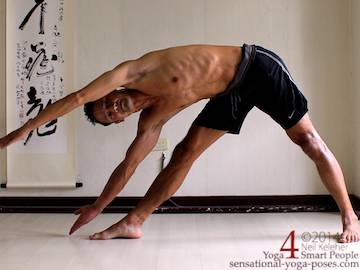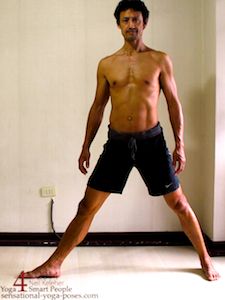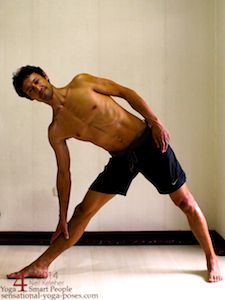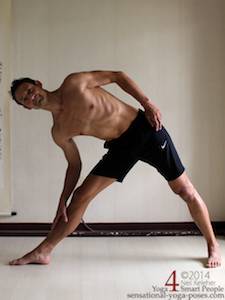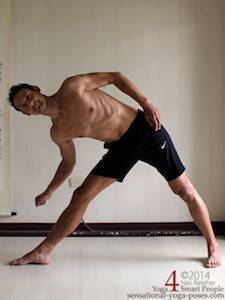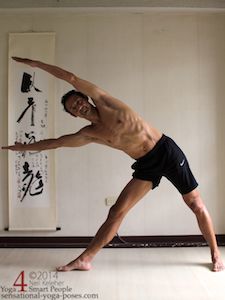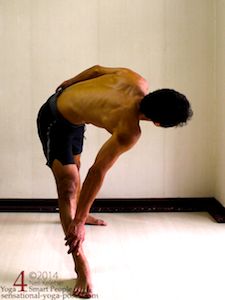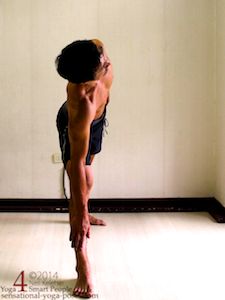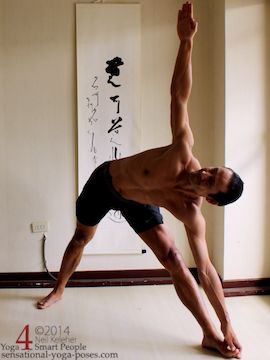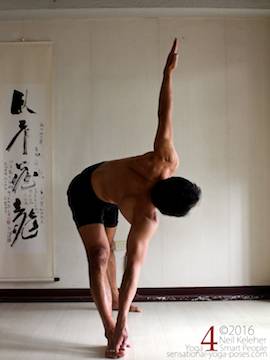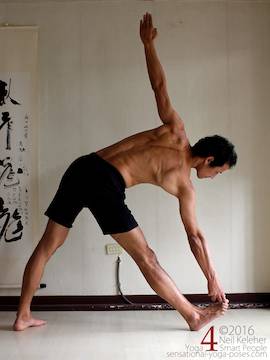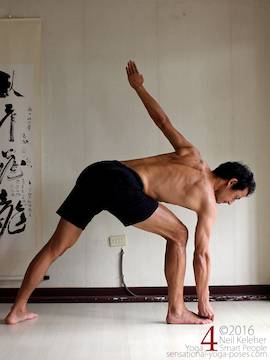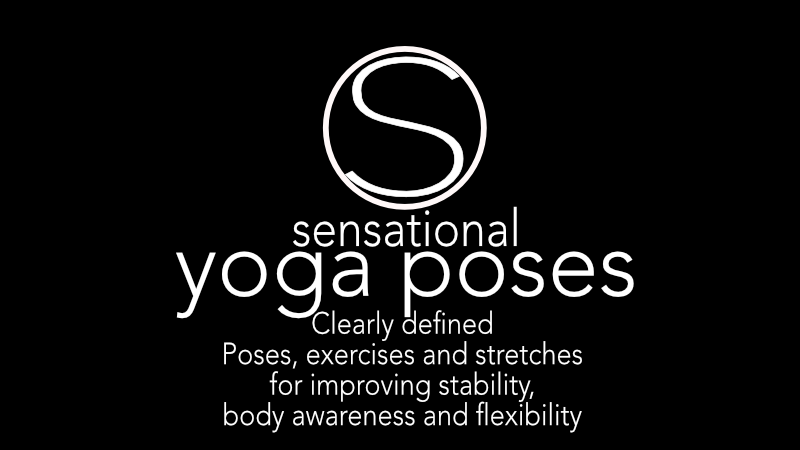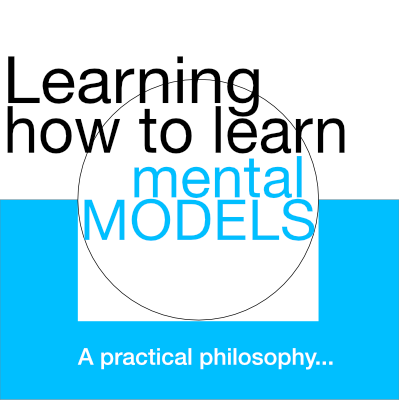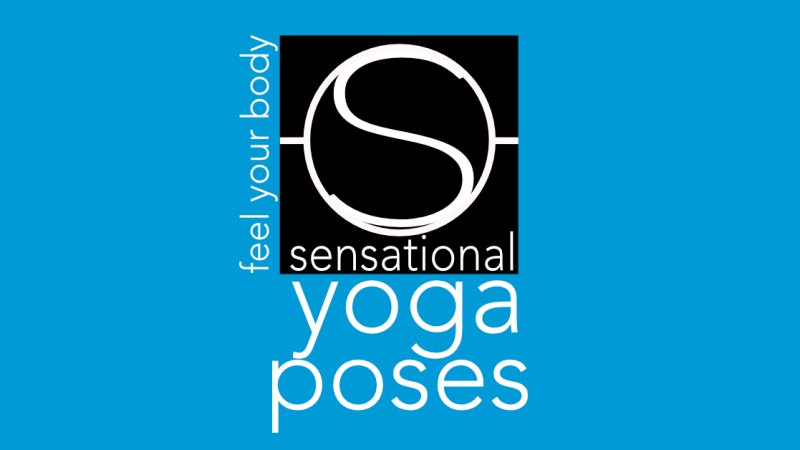Yoga Triangle Pose (Utthitta Trikonasana)
Developing Leg Strength, Stability and Control
Triangle pose could be thought of as a side bend with the legs separated and the body leaning towards one leg, with the foot of that leg turned out at 90 degrees.
In the Ashtanga standing series, this pose is done with the bottom hand grabbing the big toe. You then pull upwards on the toe engaging the torso, the arm and the leg.
An option is to do it without grabbing the toe.
In this case, you could rest your hand on your leg, or the floor. Or you could lift both arms, and even reach them to the side. The advantage of doing it with the arms lifted is that it can strengthen the hips (as long as they are active) as well as the waist and even the arms.
Triangle pose, basic points
In yoga triangle pose: the knees are straight with both feet flat on the floor and separated about a leg's length. The front foot is generally turned out 90 degrees while the back foot can be turned in slightly. The torso leans over the turned out foot with the ribcage and pelvis facing "the front".
Entering Triangle Yoga Pose
With the legs set up appropriately, I generally teach students to enter the pose by dropping the front leg hip so that the pelvis (carrying the ribcage and upper body with it) tilts towards the front leg side.
You could lower into this position slowly and smoothly while keeping your hands on your waist. Another option is to place the bottom hand either on your thigh or shin or on a yoga block or if you can reach it, the floor.
With the hand resting on the leg or the floor or some other option, an option is to lift it, after first bracing the legs, pause with the hand lifted, and then replace it for the exhale.
As you get used to keeping your torso lifted, a further option is to reach one or both hands past the ears so that your leg and torso muscles have to do more work to keep your body supported.
Be Aware of Where Your Torso is With Respect To Your Front Leg
With respect to the front leg in triangle pose, it can be easy to lean forwards, out of the pose. This isn't necessarily a bad thing unless you are unaware that you are doing it.
To become aware of how your torso is positioned relative to your leg, you can simply practice moving it.
Practice moving back and forwards between the two positions (torso over the leg, torso leaning forwards).
My usual suggestion when doing repeated movements is to focus on moving slowly and smoothly, without worrying about your breath. However, another option is to synchronize this action with your breath.
- Each inhale pull your torso back so that it is over your leg.
- Each exhale, allow your torso to lean forwards.
Some simple actions you can do in triangle pose
If you are doing a "hands free" version of triangle pose, you may want to spend some attention on activating your legs in some way. You could make your knees active and strong. This then gives an anchor for your hamstrings and other muscles that attach from the lower leg bones to the hip bone.
Another option is to make the hip joint feel strong. This then anchors muscles that act from the femur or the hip bone as well as making the hip joint stable. This can be very helpful for muscles that work on your spine.
Yet another option is to stiffen (or stabilize) your foot and ankle. Similiar to stabilizing the knee, this can give muscles that act from the lower leg bones a stable foundation from which to work on the femur and hip bone.
The Ashtanga Yoga Version of Triangle Pose
In ashtanga yoga the usual instruction for triangle pose (or utthitta trikonasana) is to grab the big toe with the first two fingers and thumb of the lower hand. Holding onto the big toe with the bottom hand you can then focus on pulling the ribcage upwards, away from the leg.
At the same time you reach up with the top arm and look up towards the top thumb.
What if you can't reach your big toe?
If you can't reach your big toe, while keeping your body over your leg, then an obvious option is to lean your body forwards. Another option is to lift the forefoot. And yet another is to bend the front knee (and subsequently work at straightening it while maintaining your grip on your big toe).
Additional Actions for Yoga Triangle Pose
For any version of triangle pose, some basic actions, apart from the aforementioned leg activation actions includes:
- Work at lengthening your spine by drawing your ribs away from your pelvis so that your waist feels long.
- And draw your ears away from your ribcage (or shoulders) so that the sides of your neck feels long also.
- Make your legs feel long.
What is triangle pose good for?
Having said all of the above, an important question to ask is, what is triangle pose aka utthitta trikonasana good for?
Personally, I mainly use it as a hamstring stretch. It's not a deep hamstring stretch, but it offers a nice way to warm up to more intense hamstring stretches.
Another thing that triangle pose can be used for is external hip rotation. The front leg (the foot that is turned out) is the leg that is externally rotated.
As a side note, because the front leg is externally rotated, you might choose to vary your pelvic tilt when doing triangle pose. I tend to prefer a forward pelvic tilt, so pubic bone down and tailbone up. And going along with this is it feels fairly natural to also back bend the spine (as well as side bend it downwards).
That being said, I would suggest experimenting so that you know for yourself which option is best. Try triangle pose with pelvis tilted forwards. Also try it with pelvis tilted back. In either case, stop what you are doing if it causes sharp pain, particularly in the hip.
Strengthening muscles that work on the SI joint
Other possible benefits, particularly if the bottom hand is lifted (but also if the bottom hand is grabbing the big toe and you are actively pulling up) is hip strengthening but also SI joint strengthening.
Triangle pose can potentially place a lot of load on the SI joint. If your hips are activated and your spinal erectors and other muscles of the torso are being used to keep the torso lifted, this can be a general indication that you are strengthening muscles that work on the SI Joint.
To be more assured of this, learn to feel your sacrum and hip bones. And learn to anchor them via your leg muscles.
More on triangle pose aka utthitta trikonasana
For some other options for doing triangle pose check out the utthita trikonasana (aka Triangle Pose) article.
For more on triangle pose as part of a sequence check out this basic beginners yoga routine with triangle pose.
For more on how triangle pose can be used to strengthen the muscles that act on the SI joint, read triangle pose (standing yoga poses)
For more on improving leg stability using triangle pose and other standing poses, read Exercises to improve leg stability: triangle pose
To stretch the hamstrings in triangle pose and a selection of other standing and seated poses read Triangle yoga pose (and other hamstring stretching yoga poses)
You may find triangle helpful for preventing (or dealing with) some types of low back pain. For more on how, check out Triangle pose as a lower back stretch
Another option for triangle pose and some other standing poses, is to deliberately bend the spine to the side. Read about that in side bending the spine in triangle pose and other yoga poses.
Another way that you can think about side bending is that is stretches the side of the spine. Read more about that (and how to do it in triangle pose) in Triangle pose and other side stretches.
Published: 2011 07 15
Updated: 2022 06 19
